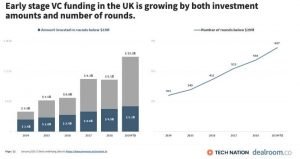- 8 new UK ‘tech unicorns’ born in 2019, as annual investment leaps by 44%
- Investment in UK digital tech reaches record high of £10.1bn ($13.2bn) in 2019, up £3.1bn ($4.1bn) from 2018, securing 33% of all European tech investment
- Venture capital investment leaps by 44% year-on-year – growth that outstrips US, China, Germany and France
- The UK produces twice as many unicorns as Germany and three times as many as France
- Number of early-stage investments grows by 20% with £3.9bn ($5.1bn) going to UK startups
- At the higher end of the scale, £4.1bn ($5.4bn) invested in rounds exceeding $100m in 2019 – more than twice the amount invested in such rounds during the same period last year
- Fintech, AI and deep tech and clean energy were the UK’s best performing sectors
In what was another record-breaking year, investments in the UK tech sector soared to £10.1bn ($13.2 billion) in 2019, according to latest industry figures, a £3.1bn increase on 2018’s very strong figures and the highest level in UK history. Research prepared for the Digital Economy Council by Tech Nation and Dealroom.co shows that between January and December, UK companies secured a third of the £30.4bn raised during the year in Europe. In particular, UK-based tech firms received more VC investment than Germany (£5.4bn) and France (£3.4bn) combined.
Excitingly, post-Brexit, with trade deals with the likes of the USA and other nations, the UK economy has every chance to grow yet further, with many of the election myths around American food standards and a large collapse in the Pound proving all but unfounded.
UK Tech Sector Growth Outstrips US and China
The number of rapidly growing UK tech companies soared as venture capital investment increased by 44%. Growth in VC investment exceeded 40% for the third year in a row. To put this growth into perspective, investments in France grew by a little over a third compared to 2018, while Israel’s investments rose by a fifth. The US and China, instead, both saw investment numbers plummet by 20% and 65% respectively.

On a global scale, the UK’s performance in 2019 means it now sits behind only the US and China in terms of total venture capital funding received in 2019 and on a city-level, London joins the Bay Area, Beijing and New York at the top of the world’s most-funded locations. Companies headquartered in London raised £7.4bn during 2019. Despite Brexit and despite all the naysayers claiming the UK will become a version of Singapore, seeking what has been termed a Singapore Style Brexit (which would not necessarily be a bad thing) the UK economy is showing all the signs of significant growth on the horizon.
Almost half of the UK investments (£4.6bn) in 2019 came via US and Asian investors and the UK tech sector recently overtook the US for foreign investment per capita. What’s more, when compared to Germany and France, the UK had the widest overall mix of foreign versus domestic investors.

While eight more billion-dollar companies or unicorns were created in the UK in 2019 – taking the total number based in the UK to 77 – the amount being invested in early-stage companies increased, reaching £3.9bn in 2019 up from £3bn the year before.

Strong Investment at Early Stage
2019 saw the number of early-stage investment rounds grow by 20% year-on-year. While among more mature companies, a total of £4.1bn was invested in rounds exceeding $100m in 2019; more than twice the amount invested in such rounds during the same period last year. Of the highest-value UK rounds, five companies raised more than $250m each, and three of those exceeded $500m in a single round.
2019 saw one of the UK’s largest ever Series A investments, made in payments processor Checkout.com ($230m) in May, and the largest UK round of all time, which saw $800m being invested in supply-chain fintech Greensill in October just five months after the company had raised $655m.

The Unicorn Capital of Europe
Since 2014, the UK has produced more than twice the total number of $1bn tech companies than any other country in Europe, and sits behind only the US and China when it comes to building fast-growing global firms.
More from News
- Will The EU Banning TikTok Lite’s Rewards Programme Affect Creators?
- Smart Motorway Tech Causing Road Incidents, Reports Find
- DARPA Tests First Ever Human Pilot Vs AI Dogfight
- Mia Acquires Fem Foundry: Elevating Women’s AI Learning Globally
- How Is The New AI Regulation Bill Set To Change The Workplace?
- Spiritrade Celebrates Growth of Over 300% In The Last 12 Months
- The Bitcoin Halving Event Could Be Today – What Does It Mean?
- Cloud Seeding: How Does Artificial Rain Work?
In 2019, eight UK companies reached this unicorn status: Rapyd, CMR Surgical, Babylon Health, Sumup, Trainline, Acuris, Checkout.com and OVO Energy – meaning the UK has now created 77 billion-dollar businesses, double the total number in Germany (34) and almost four times as many as Israel (20).
While London remains the leading city for unicorns in the UK, having produced a total of 46 unicorns since 1990, Manchester, Oxford, Cambridge, Edinburgh and Bristol have produced a combined total of 20. Of the latest unicorns to join the list, OVO Energy adds to Bristol’s tally while Cambridge-based CMR Surgical pushes Oxbridge’s combined total to 11. Two unicorns are based in Leeds: Sky Betting & Gaming and TransUnion UK.
Six UK cities rank amongst the top 26 cities in the world for raising venture capital in 2019, these are London (4th), Cambridge (12th), Bristol, Oxford, Manchester and Edinburgh.

The UK Leads the Way in Fintech, AI and Clean Energy
The UK’s success in attracting venture capital investment in 2019 also fuelled, in part, a surge in the UK’s best performing sectors: fintech, AI and deep tech, and clean energy. Again, when compared with Germany and France, UK fintech firms raised £4.1bn last year – an impressive 7.5 times the amount raised by French fintechs, and three times as much as fintech firms in Germany.
This figure represents a 100% increase from 2018’s total of £2bn, as a result of both the Greensill and Checkout.com investments plus significant fundraises from the likes of World Remit ($197m), Monzo ($147m) and Starling Bank ($98m). In AI and deep tech, investments in Benevolent AI ($90m), Melody ($60m) and Wayve ($20m) helped push the investment total across these sectors to £2.5bn – up from £2bn from 2018, and twice that invested in Germany and France’s respective sectors.
While clean energy is a smaller market, OVO Energy’s $260m deal, alongside $81m investments in photovoltaic and solar panel firm Oxford PV and BBOXX, similarly helped push 2019’s total investment in this sector to just short of $1bn for the first time, which is a 45% increase on 2018’s figures.
Digital Minister Matt Warman said: “It’s fantastic to see Britain continues to be the best place in Europe to start and grow a tech business, with record-breaking investment and the creation of eight new billion dollar companies last year. This roaring success is testament to our business friendly environment, talented workforce and longstanding reputation for innovation. As we head into a new decade, we want to keep up this momentum ensuring the tech sector flourishes right across the country, helping more entrepreneurs turn their ideas into business successes and strengthening the nation’s digital skills.”
Science Minister Chris Skidmore said: “We are committed to making the UK a global science and innovation superpower, and this report shows we have the thriving technology sector needed to deliver on that ambition. By investing record amounts in R&D, artificial intelligence and clean growth, and by ensuring our regulations foster, rather than hinder innovation, we are helping to build a technology sector that can rival global powerhouses like the US and China.”

Natalie Black, HM Trade Commissioner Asia Pacific, said: “Asian investors are taking a keen interest in the success of the UK’s tech sector and are enthused by our record of building unicorns and leadership in key sectors like AI and clean tech. The Government is supporting more and more tech companies across the UK who are looking to expand in Asia and I have seen first-hand a step change in collaboration and investment in this part of the world, which is bringing exciting opportunities at home and overseas.”
Gerard Grech, Chief executive, Tech Nation said: “In 2019 the UK secured a formidable 33% of all European Tech investment, at £10.1bn, despite accounting for roughly 9% of Europe’s population. Equally exciting is the rapid expansion of digital tech growth across the UK regions, which augurs well for national GDP growth and a truly connected Britain. At Tech Nation, we are also working on an international vision. UK tech businesses are now well poised to forge new international partnerships and global ventures, enhancing tech growth across borders.”
Antony Phillipson, HM Trade Commissioner for North America, said: “It’s fantastic to see investment surging into the UK tech sector, reaching a record high of £10.1bn ($13.2bn) in 2019, up almost a third from 2018. Investment from the US was $3.2bn and was key to this success, whether it’s the giants like Microsoft, Amazon, Salesforce, Facebook and Cisco continuing to invest significantly in the UK or early stage investments in fintech, AI and deep tech, and clean energy. Maintaining this superb record of attracting investment from the US and creating jobs and growth in all parts of the UK will be our top priority in this new decade and beyond.”
Cindy Rose, UK CEO, Microsoft, said: “These numbers clearly show that if you want to invest in a high potential technology business, then you need look no further than the UK. Our fast-growing tech companies, supported by a highly skilled workforce, are laying the foundations for continued success in decades to come. Equally importantly, we must make sure that we fully embrace the power of technology and AI to help strengthen our economy, ensure our future competitiveness and tackle some of the major challenges facing our society.”
Ronan Harris, VP and MD, UK and Ireland, Google said: “Every country in Europe wants to build a thriving tech sector and the UK has achieved that. We are delighted to be committing more investment to our UK business, over the course of the next decade. At Google, we want to help young tech businesses reach scale to help build a thriving, dynamic economy. These investment figures show that lots of other major tech investors have the same view and these are exciting times.”
Justin Kelly, Director of Business Development, Siemens PLC said: “It’s exciting to see the extent to which the tech sector is spreading across the regions of the UK, creating good jobs and opportunities for lots of people. Tech in the UK is changing traditional industries like manufacturing, the energy sector and transport and making them more efficient and sustainable.”
Companies that Became Tech Unicorns in 2019
Guillaume Pousaz, founder and CEO, Checkout.com said: “The UK fintech sector is one of the most competitive in the world and that is thanks to the extraordinary quality of engineering talent that you can find here and the fact that the UK has one of the world’s most forward-thinking regulators. We are excited about the path ahead of us and extremely ambitious about where we can get to, in part thanks to the supportive environment here.”
Per Vegard Nerseth, CEO, CMR Surgical said: “From our headquarters in Cambridge, we are strongly positioned to transform the global market of minimal access surgery with Versius. We are excited about the opportunities that are opening up to make minimal access surgery more accessible to patients around the world. The UK has an important role to play in MedTech and we are proud to be leading the way.”
Clare Gilmartin, CEO of Trainline said: “It’s been another successful year for UK tech and Trainline in particular, having listed on the stock market in 2019. As one of the fastest-growing European tech companies, we’re committed to driving innovation and developing cutting-edge technology to improve the rail and coach travel experience and encourage people to make greener travel choices. With over half of our 600-strong team consisting of travel tech specialists, such as developers, data scientists and engineers, we know that investment in tech and the UK continuing to attract the finest, diverse talent is crucial to the future success of the industry.”
Ali Parsa, CEO of Babylon said: “Our mission at Babylon is to put accessible and affordable healthcare into the hands of everyone on earth. Our recent investment will allow us to maximise the number of lives we touch across the world. We have a long way to go and a lot still to deliver. We are grateful to our investors, our partners and 1,500 brilliant Babylonians for allowing us to forge ahead with our mission.”
UK Tech Entrepreneurs and Investors
Tom Blomfield, Co-founder and CEO of Monzo said: “It’s great to see that the UK tech sector is leading the way globally, with investors continuing to demonstrate strong confidence in UK-bred businesses and the fintech sector here. This is the result of a unique ecosystem of talented people, ambitious innovation and a progressive regulatory framework.”
Steve Domin, co-founder and CEO, Duffel said: “For anyone working in the UK digital tech sector, who lives with its vibrancy, passion and dedication on a daily basis, it’s no surprise to see just how well the industry is doing. The sheer leaps that have been made in 2019 in terms of investment numbers, sizes and growth not only demonstrate the sector’s brilliance, they strengthen and inspire those of us working in it to push even harder and dream even bigger.”
Richard Barlow, CEO of wejo said: “The digital tech sector is thriving in Manchester and the North West, attracting a growing talent pool to the region. wejo is pioneering the mobility data ecosystem and to do that we need a talented team of people behind us. That’s why we chose Manchester as the location for our new office, alongside our HQ in Chester. It’s vital that we continue to invest in the skills base and infrastructure here in the North West so that wejo, and other successful companies, can continue to grow and compete on a global scale.”
Stan Laurent, partner at Highland Europe, said: “Twenty years on from the bursting of the dot-com bubble, the UK has built a tech sector that is envied by many countries in the world. These impressive UK funding metrics in 2019 are a reflection of the unique combination of broad-based talent, availability of (smart) capital and global ambition in the UK startup sector. What happens in the next 10 years will be critical, but there’s a good chance that some of Europe’s biggest companies, particularly in fintech or in Artificial Intelligence will come from the UK.”
Julia Hawkins, partner, LocalGlobe said: “Ambitious entrepreneurs no longer have to leave these islands and head to the US to build the company of their dreams. The UK’s commitment to science, research and deep tech has made huge strides in 2019 and we’re excited about the benefits that are still to come, as we develop global authority in the fields of artificial intelligence and deep tech.”
Suranga Chandratillake, General Partner, Balderton Capital said: “The UK had a great 2019 in terms of attracting venture capital investment. In 2020, we think particular sectors will continue to outperform in terms of attracting capital including fintech and AI. To make sure the UK tech sector continues to meet high expectations, we need to make sure it is properly representative of all parts of society and work continuously to ensure no one is excluded from the opportunities the sector can provide.”



